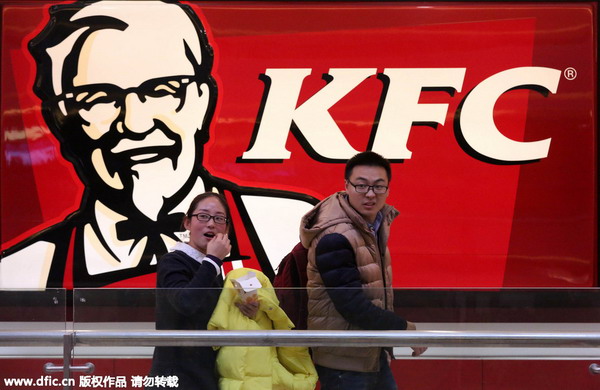KFC reports reveal Western media's bias
Updated: 2015-06-04 07:33
By Mike Bastin(China Daily)
|
|||||||||
 |
|
People walk past a fastfood restaurant of KFC in Huaian city, East China's Jiangsu province, Feb 14, 2015. [Photo / IC] |
Amid widespread reporting in the West, KFC launched lawsuits on Monday against three Chinese companies whose social media accounts allegedly made comments about the origins of the chicken used by KFC; including the claim that KFC chicken originates from chickens with eight legs.
But these recent reports and media coverage in the West generally represent the continuation of a stupendously hypocritical theme with contempt and mocking of China's social media on one hand and on the other hand attempts to paint a picture of strict Internet regulations in China.
Clearly, the Western media cannot have it both ways.
Social media platforms in China, and these probably innocent and partially tongue-in-cheek comments about KFC, quite rightly allow users freedom of expression. Western media please note: No attempt at curtailing such comments has been made.
Of course these comments have also been reported in the Chinese media but not at all in the same KFC finger-pointing manner.
Furthermore, the Chinese public also appear not to attach serious importance to these KFC postings, something also not reported in the Western media.
It is also noteworthy that recent Western media reports on KFC's extraordinary legal action do not refer, even briefly, to the history of the infamous food safety scares associated with KFC in China.
In 2005 the toxic red dye Sudan 1 was found to have been used by KFC in its tomato sauce at KFC stores in China.
But even more recently, only last year KFC once again failed to earn the trust of the Chinese public with reports of contaminated chicken supplied to its stores in China.
Chinese consumers, who have traditionally flocked to such Western fast food chains as KFC because they were perceived to be safer to eat at, are now understandably wary.
The series of food safety scares in recent years has added to KFC's competitive decline too.
It is highly likely that this knee-jerk legal action launched by KFC is a result of the increasing competitive pressures it faces in China. Chinese competitors are growing stronger and stronger. And foreign brands have lost a certain mystique and adoration in the eyes of many Chinese consumers, not just in the food sector.
Some Western media reports appear to suggest that China should do more to protect foreign companies and that KFC has somehow been treated unfairly. Of course no reference is made to the profits KFC have enjoyed in China over many years while their market presence in most other countries has dwindled. Just where would KFC be without the China market?
Chinese leaders have reiterated that the government will continue to protect the lawful rights and interests of foreign companies operating in China, and it is the decline in competitiveness experienced by KFC in China should be the real focus of attention.
The author is a visiting professor at the University of International Business and Economics in Beijing and a senior lecturer at Southampton University.
Related Stories
KFC sues 3 firms for rumors on social media 2015-06-02 07:34
KFC gives lovebirds free ice cream 2015-05-22 16:36
KFC rivals Starbucks in China 2015-04-13 08:50
Pressure on KFC after McDonald's says no to antibiotics in chicken 2015-03-19 07:27
Today's Top News
Inspectors to cover all of military
Britons embrace 'Super Thursday' elections
Campaign spreads Chinese cooking in the UK
Trump to aim all guns at Hillary Clinton
Labour set to take London after bitter campaign
Labour candidate favourite for London mayor
Fossil footprints bring dinosaurs to life
Buffett optimistic on China's economic transition
Hot Topics
Lunar probe , China growth forecasts, Emission rules get tougher, China seen through 'colored lens', International board,
Editor's Picks

|

|

|

|

|

|







